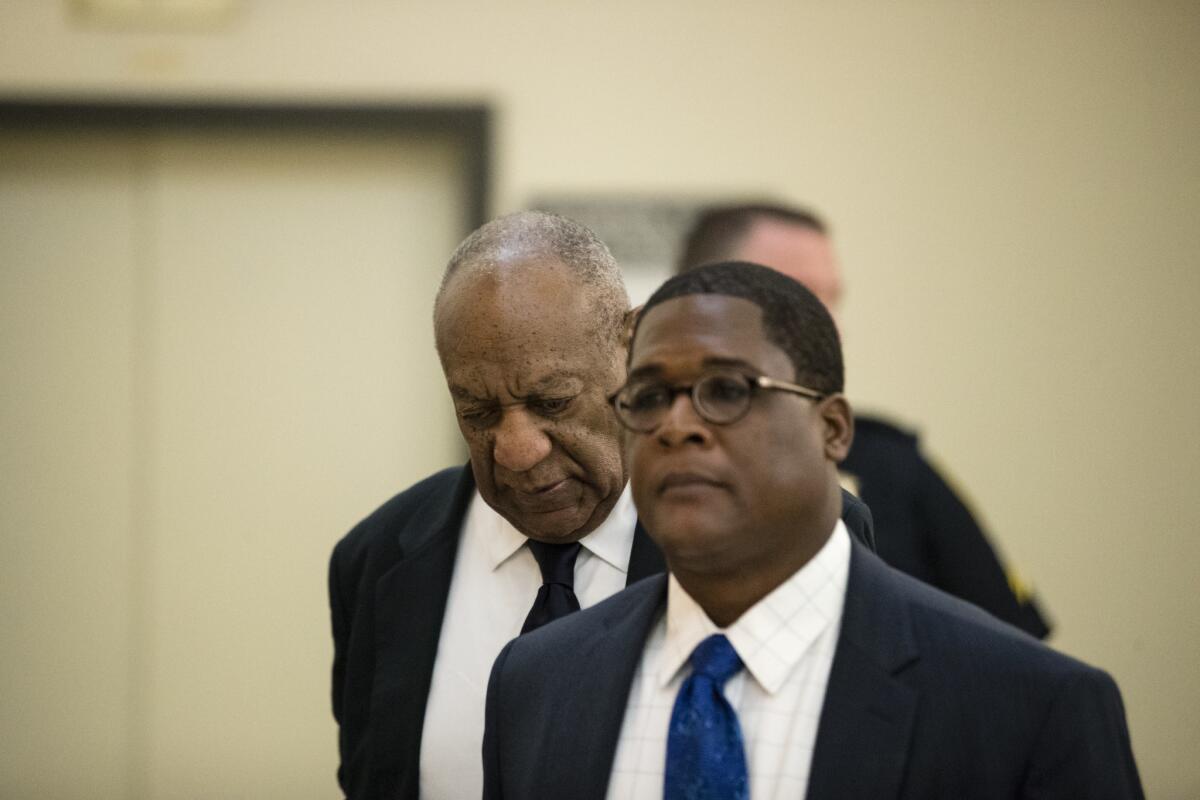Jurors in Bill Cosby trial end day of deliberations with no verdict

- Share via
Reporting from Norristown, Pa. — Courtroom A, the stately space where the Bill Cosby sexual assault trial is unfolding, has been a beehive of activity over the last week — tearful testimony, fiery arguments, large screens projecting text of tabloid-worthy details.
Into the evening hours Tuesday, however, the excitement remained in the hallways outside the Norristown, Pa., courtroom.
The jury broke at 9:30 p.m. after 12 hours of deliberations — and nearly 17 hours overall — with no verdict. The judge sent jurors back to their hotel and ordered them to reconvene at 9 a.m. Wednesday. Jurors on the sequestered panel are from the Pittsburgh area several hundred miles away; O’Neill had made clear that returning jurors home was a priority and has suggested he would encourage them to deliberate as late in the day as possible.
Cosby is charged with three counts of aggravated indecent assault for an incident at his home in January 2004 with Andrea Constand, a former Temple University basketball staffer. Constand says she was drugged during the encounter, which involved digital penetration. Cosby said in a civil deposition read aloud in the trial that the interaction was consensual. If convicted, he faces up to 10 years in prison on each count.
Jurors returned to the court with several questions throughout the day Tuesday. In one, they asked for a re-read of the portion of the deposition that Cosby gave more than a decade ago focusing on his relationship with Constand, since meeting her in 2002 through the night of the alleged incident.
In another, jurors asked the judge, Steven T. O’Neill, to define “without the knowledge” of the victim in the sexual-assault count pertaining to the administering of an intoxicant. The question appeared to address whether that clause would also include someone who voluntarily took pills without asking what they were, as Cosby described Constand’s actions. In another question late in the day, jurors asked to listen again to the testimony of an officer who was the first to interview Constand when she reported the incident in 2005.
The officer, from Constand’s native Canada, provided a much earlier view than other accounts of the night of the alleged assault at Cosby’s home. According to the officer’s account, Constand characterized the alleged assault as happening after a restaurant dinner she and Cosby had with administrators of a local high school, not a private meal at Cosby’s home. (She later revised that detail.) The inconsistency suggested the jury was interested in Constand’s credibility.
But much of the day’s activity was centered in the hall outside the courtroom, where reporters and observers milled about, trading gossip and trial theories.
A group of activists including Cosby accuser Linda Kirkpatrick and lawyer Gloria Allred, who represents many alleged Cosby victims in civil suits, were waiting and conferring. In a bag nearby sat protest placards, ready for use in case of an acquittal. Allred said she hoped a decision would come soon because later in the week she was set to testify before Congress on sexual-assault statute of limitation laws.
Cosby, helped by an aide, walked in and out of the courtroom for the jury questions, passing through the courthouse halls to enter a private room where he and some associates have been waiting during breaks. During the jury questions, he looked engaged as the testimony was re-read and even seemed to smile hearing a joke he had made about why he had given Constand a particular phone number.
Outside the courthouse, the Cosby team released a statement from Marguerite Jackson, who for the last 30 years has worked as a student advisor at Temple. The statement said that when Constand was working at the university, she had told Jackson she had not been sexually assaulted by an anonymous well-known personality but could plausibly claim she was to win money in a civil suit.
“Her response was that it had not happened but she could say it happened and file charges, file a civil suit and get the money,” Jackson said in the statement.
Jackson’s account was released by Cosby spokesman Andrew Wyatt during a lunch break. The Temple student advisor was sought as a witness by the defense but was rejected by O’Neill on hearsay grounds after Constand testified she did not know Jackson. Later in the day, the statement, which was the defense’s official order of proof to admit Jackson, was entered in the court record
Wyatt criticized the decision not to allow Jackson to testify.
“We felt that it was unfair that [Constand] was allowed to testify, and Ms. Jackson was not,” Wyatt told reporters. Wyatt added that Cosby is “doing good, his spirits are up, and we believe this jury is highly intelligent.”
See the most-read stories in Entertainment this hour »
Twitter: @ZeitchikLAT
ALSO
The legend and the legacy of Bill Cosby come under scrutiny in his trial
Bill Cosby’s accuser has her dramatic, detailed day in court
UPDATES:
6:40 p.m.: The story was updated with news that jurors had adjourned for the night.
5:25 p.m.: The story was updated with more details from the courtroom.
3:20 p.m.: The story was updated with a jury question about testimony from a police officer.
10:40 a.m.: The story was updated with a question from the jury and a statement released by Cosby’s spokesman.
The story was originally published at 9:25 a.m.
More to Read
Sign up for Essential California
The most important California stories and recommendations in your inbox every morning.
You may occasionally receive promotional content from the Los Angeles Times.











